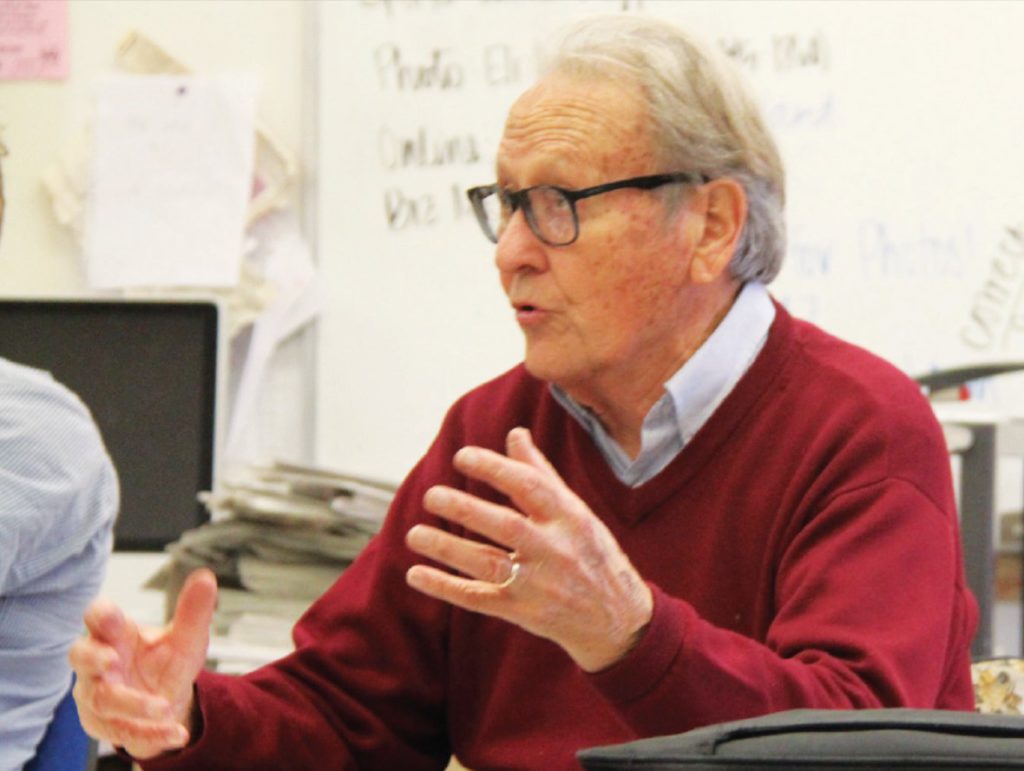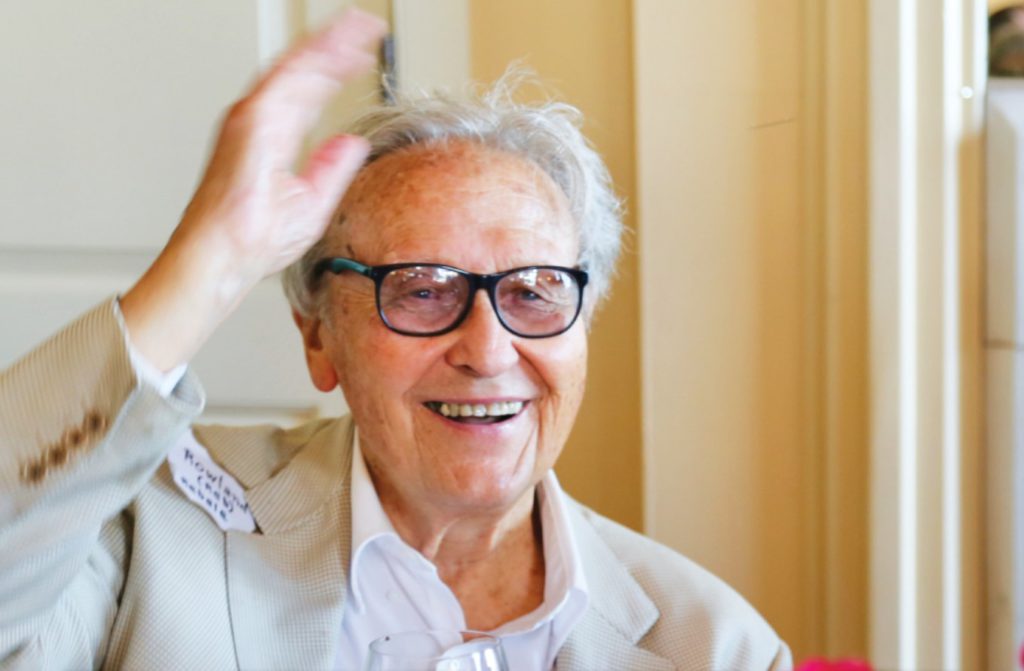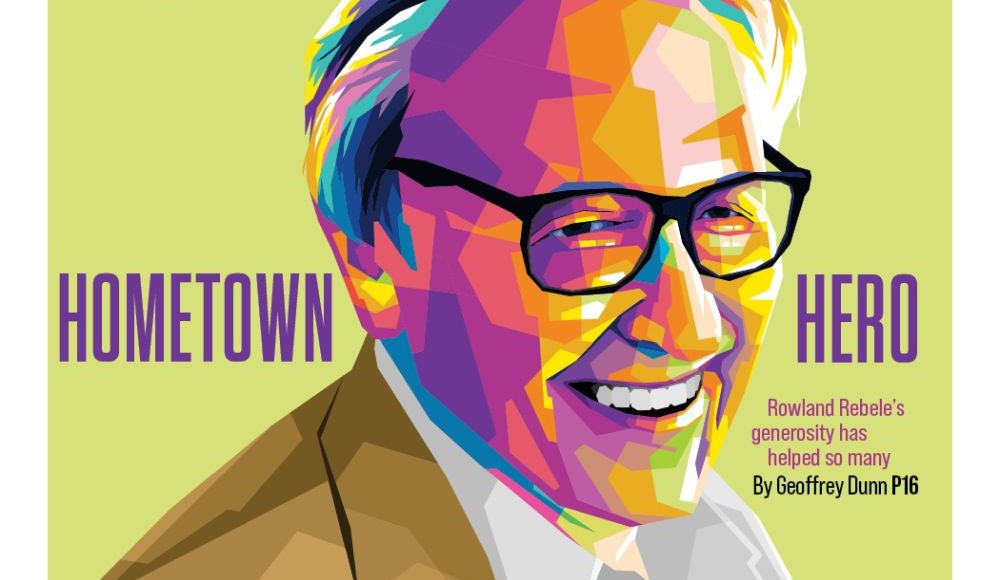Rowland “Reb” Rebele, a man who cast a giant shadow in Santa Cruz County—one vibrantly colored by passion and generosity and an intense love of his community—has died at the age of 93, with “his boots on,” as he had hoped, and with his signature smile and generosity of spirit gracing his presence until the end.
The void he leaves will be difficult, if not impossible to fill, but make no mistake about it—of this I am absolutely certain—he lived his life in such a way that he wanted (and often demanded) others to follow, not only while he was alive but also, and most importantly, after he was gone. To live like Reb Rebele was to be generous and gracious and giving, and he did it with perpetual passion and joy.
Both Rebele and his wife of nearly 70 years, Pat, covered the vast reaches of Santa Cruz County and beyond with their beneficence and largesse. Philanthropy became their way of life.
During their time here, the Rebeles have contributed millions of dollars to more than 100 charitable enterprises in the region, ranging from social services to the arts to journalistic programs to museums to food programs and scholarships and First Amendment protection campaigns—most prominently to Homeless Services, of course, but also to the Community Foundation, the Santa Cruz County Symphony, [Good Times Santa Cruz Gives], Spectra Plus, Cabrillo College, New Music Works, the Cabrillo Music Festival and the UCSC Foundation. They’ve even established academic chairs at both Stanford and UCSC (the latter reflecting Pat’s love of the visual arts).
Thousands of county residents pass by their names daily, at the intersection of Highway 1 and River Street, atop the Rebele Family Shelter on the Housing Matters campus, to which they contributed a half-million dollars in 2003.
When Federal funds were pulled at the last minute from the center’s Interfaith Satellite Shelter program, Rebele, an active member of the center’s board of directors, immediately plopped down another $62,500 to salvage the critical program. “It was the right thing to do,” he recollected only a few weeks ago. “The only thing.”
“I think what made Reb so special was his integrity,” said Phil Kramer, the CEO of Housing Matters and who worked closely with Rebele throughout the years. “He always did what he said and you could always count on him. He was unwavering in his commitment and wasn’t at all shy about asking others to join him to make a positive difference in the lives of people who were having a tough time.”
Rebele was legendary for getting in the trenches when dealing with homelessness. Several people in the community commented on the fact that Rebele would participate in the Point-In-Time Census count of people experiencing homelessness in the county. This would involve going out to designated areas to count or estimate the number of people who were homeless. He wasn’t afraid to get his boots dirty.
“Reb was someone who unfailingly ‘walked the talk,'” added Kramer. He was a hard guy to say no to. I’ve heard stories about donors who were nervous about getting a call from Reb because they knew that he wouldn’t take no for an answer. I think he wanted everyone to be a part of making the community better.”
Susan True, CEO of the Community Foundation Santa Cruz County, began working with the Rebeles more than 20 years ago at CASA and has worked on projects with both Reb and Pat ever since. She described Reb as “as fierce an advocate as he is a loving friend. He has nurtured relationships over decades and he has brought brings together his circle of fans and friends as a force for good.”
“Reb,” she continued, “was the guy we have all counted on to rally us together to get big things done. He approached community with his sleeves rolled up and ready to work for the common good and to lift up those who need a hand. He got involved deeply as an advocate, a donor, a doer, and an audience member. He unapologetically pushed this community to do right by our fellow residents. What Reb touches, he makes more just. What Reb touches, he makes more beautiful.”
Rebele made a giant impact in the County at large but also on those who worked with him one-on-one. He was a steady beacon in the night.
“I always found him to be the epitome of relaxed graciousness,” said former Santa Cruz Mayor Emily Reily, who worked with Rebele on a variety of projects, including the Tannery Arts Center. “I had 100% of his attention when we talked. He taught me to always wonder how money could best be used to move a project forward, reminding me to think of money as a tool. And he reminded me to remember that helping people long term is always the goal.”
“He was always very gracious and cordial” said George Ow, who along with his wife, Gail Michaelis Ow, has often joined with Rebele in his philanthropic mission throughout the county. “He has constantly inspired me and showed me new ways of thinking about the community. He was a generous, generous man.”

Setting a Larger Table
The pain of Reb’s loss is acute right now for all of those who worked with him in Santa Cruz County for the past four decades, and it is painfully sharp, I should acknowledge with full disclosure, at Good Times and Metro Newspapers, where Rebele’s influence was extensive and far-reaching. In many respects, he was the godfather of this enterprise.
Dan Pulcrano, the founding Publisher of Good Times, had a decades-long relationship with Rebele.
“I met him after I graduated from UC Santa Cruz and was starting the Los Gatos Weekly. I visited him at his Aptos home and pitched him on investing. He pulled out a black binder, wrote a check for $500 and handed it to me. Those first dollars were the catalyst for starting a company, and everything that came after that. His Paradise Post press printed our newspapers for a number of years, and he was generous in supporting free press associations, journalism internship programs and Santa Cruz Gives when we launched that, along with shelter for unhoused individuals. As a philanthropist, he was one of a kind.”
Rebele contributed greatly to Cabrillo College’s journalism program. As a result, Brad Kava, department chair and editor of Good Times, had an intimate relationship with Rebele for many years.
“Rowland Rebele meant the world to me personally and as a journalism mentor,” said Kava. “We met monthly at Manuel’s in Aptos and he reviewed my magazine, Growing Up in Santa Cruz, which he also supported. We talked about my journalism students at Cabrillo and he regularly sat in the classroom and talked to them.
“During Covid, when the sky was falling, he generously contributed to keep us printing. He really believed in community journalism with all his heart.” Kava continued. “I tried to repay him, but he wanted nothing to do with it. He just wanted to help people.”
In the interest of full disclosure, Rebele has been a mentor of mine as well, and when I sought to establish a monthly journalistic presence in the aftermath of the 1989 Loma Prieta Earthquake (and the resulting demise of the Santa Cruz Sun), he provided the requisite resources, a break on printing prices at the Paradise Post and oodles of advice on the business side of journalism (which he absolutely delighted in and I absolutely did not). The experiment lasted for five years and landed smoothly enough when Pulcrano decided to bring Metro Santa Cruz to the community, which eventually led to him purchasing Good Times and consolidating operations in 2014”
Several weeks ago Kava assigned me to write a feature about Rebele celebrating his philanthropy and his love of community. He thought it would be a perfect story for the coming holiday season. I agreed and readily accepted.
When I called Reb in early November, he told me that he had recently suffered a “small injury,” and that he was recuperating at a long-term medical rehab facility in Capitola. He assured me that he “would be out in a couple of weeks.” I told him that I knew the facility well and that I would be there to see him the next day.
When I first arrived, Reb was in the middle of some physical therapy, but he greeted me warmly, and joyously as was his wont, his big broad smile beaming, his green eyes glowing, seemingly backlit with a golden hue. I did my best to assess the situation. His grey hair remained thick and full like a lion’s mane, and his handshake firm and strong, announcing a formidable presence on the other end. We checked in about family and the state of the local journalism field (letting me know how much he appreciated Kava’s gesture) and, with that, I told him I’d be back in a few days.
On my second visit, he seemed a bit more present, fresher. He was resting upon my arrival and I noticed how smooth his facial skin still was, how youthful his appearance, even after nine momentous decades. After greetings, I told him I had been doing a deep dive into his life story, and that I wanted to go over some of the details. I had read a couple of profiles of him that had appeared on the internet. He demurred at first (“that shit’s boring and old news”), but when I persisted (“some of it doesn’t quite add up”) he consented and we spent the next two hours in a wonderful conversation. Reb Rebele was nothing if not a delightful raconteur.
For the next two hours, the conversation ranged from politics (both local and national), music, San Francisco Seals baseball, his Stanford classmate Sandra Day O’Connor (who also died at the age of 93 this past week), Donald Trump (“disgusting, but also dangerous”). While the conversation bounced around, he was sharp and focused. At one point we landed on one of his journalistic codes: “I’ve always tried to look to what’s behind the moment,” he declared. “And what’s behind it has always been a good place to start, the foundation of dedicated, sincere, honest reporting. Truly, that has been the approach that has sustained me [all these years].”
While Reb’s death was attributed to heart failure, his kids found out the day after they shared Thanksgiving with him that he also had Covid, said his son, Chris. He died Saturday, but they had to wait until they passed their own Covid tests to tell their mother, Pat, in person on the following Wednesday, which was her 94th birthday.
Family Values
Rowland Kenneth Rebele was born in San Francisco in1930, during the hard, dark days of the Great Depression, but Rebele acknowledged that he and his family “escaped the Bay Area’s bread lines” and that he had been raised under “privileged circumstances.”
His father, Ralph H. Rebele, was the executive vice-president of Wells Fargo Bank at the institution’s national offices in the City, as well as an officer of various amateur golf associations throughout the state. His family resided in San Francisco’s tony Balboa Terrace neighborhood (the spacious Spanish-style manor in which he was raised still stands) and motored around the Bay Area in a cherried-out Buick Limited convertible.
“Let’s not kid ourselves,” he said with a smile. “It was all pretty ritzy. He chuckled at the thought that for all the convertible’s splendor, however, it took a host of laborers to “pull the top down. It was a real enterprise. I think my father drove through all of World War II with an open top.”
For high school, Rebele attended the prestigious St. Ignatius College Preparatory School, then located just above the City’s Panhandle (he was a classmate and lightweight basketball teammate of future San Francisco Mayor George Moscone), where most of his energies were spent on the debate team and various school publications. His brief biography in the S.I annual noted that he was known for his “fine writing.”
Following high school, Rebele left San Francisco for Stanford University, where he majored in Journalism (a rare major in those days) and edited the Stanford Daily during the spring semester of his senior year. Rebele loved Stanford and all the activities and connections and opportunities it afforded him, particularly working on the daily at one of the country’s most prestigious universities.

“I had caught the journalism bug early” Rebele told me recently. “As early as junior high I suppose.”
San Francisco, like most metropolitan regions of that era, was abuzz with newsprint, with young newspaper boys hawking their various publications on street corners, including the Chronicle, Examiner, Bulletin, News, Call and the Oakland Tribune among them. Competition was fierce, the journalism cutting-edge and often hyperbolic, as newspapers still carried the zeitgeist of the day.
“I wanted in the game,” Rebele acknowledged. “Very much so. I was passionate about it. I found it all very colorful and exciting.”
Following his graduation from Stanford, Rebele headed off to Harvard Business School, where he completed his first year, then embarked on a three-year stint as an officer in the U.S. Navy (achieving the rank of Lieutenant in the Informational Service Branch). But he wasn’t done with his education: He went back to Harvard, where he completed his MBA on the G.I. Bill. “From my father, of course, but also from some of my friends at Stanford, I realized that there were codes and a secret language to conducting business,” he observed. “I wanted to be fluent in them.”
He had also witnessed many of the San Francisco papers fold in his young life, and he never wanted to be “among those casualties” as he began his life’s journey.
While in the Navy, Rebele also sealed the deal with “the love his life,” Patricia Ann “Pat” Smith, a young Sausalito socialite (“quite toity,” Rebele grinned) whom he had known since their adolescence (they had gone to the same junior high in San Francisco, ironically named Aptos). They had dated and “kept in touch” through the years. “She has been the light of my life,” he paused with special conviction. “Hell, she’s been my everything.”
Once Harvard and the Navy and his wedding were behind him, he wanted entrance into the newspaper game (the bug still had a strong hold of him), but he also realized that he didn’t want to spend his life behind a typewriter: he wanted a bigger piece of the pie.
Rebele set about finding a newspaper to purchase on what were lofty goals but limited assets. He realized quickly that Bay Area publications were beyond his reach economically. He was disappointed, but his will was unbowed.
With some seed money supplied by his skeptical father, who viewed journalists as “either drunks or dirt poor,” Reb, with Pat working closely beside him, purchased the Coalinga Record, located in the isolated nether-regions of the western San Joaquin Valley. It was a weekly publication. The price, he recalled, was somewhere in the vicinity of $35,000.
The Rebeles spent four years in Coalinga learning the ropes —pushing for hard-hitting journalism and a lively opinion page, but also understanding the business side, everything from selling advertisement to personnel management to understanding the dynamics of purchasing barrels of ink and rolls of newsprint.
“Community relations were the key ingredient,” he told me. In four years they had built up circulation and advertising revenues. He sold the operation for a hefty profit—roughly three times the original purchase price—then set his sight on bigger game.
With a new partner in hand, Lowell Blankford, a widely respected veteran journalist, Rebele purchased a trio of weekly papers on the outskirts of San Diego—the Chula Vista Star-News, The National City Star-News and the Imperial Beach Star-News—and focused his energies and acumen on the business side of the ledger. The Rebele recipe once again proved successful and he took great pleasure in taking on the well-established San Diego Tribune.
Meanwhile, Pat gradually moved out of the business, for the most part, and set about raising a family that included a trio of adopted children: Marianne, now 60, who works at UCSC; Andrew, 58, CEO of a Seattle-based electric boat maker; and Christopher, 56, a realtor.
At a time when small town newspapers were cash cows (and, as a result, highly valuable assets), Rebele and Blankford grew their enterprises in bourgeoning San Diego County, then expanded to dozens of papers across California and ultimately publications in several states, including Wisconsin, Colorado, Illinois, and Minnesota. Rebele even went outside the newspaper field to dabble in hotels, warehouses and even a Gold’s Gym franchise as far away as Texas.
In 1977, they purchased the Paradise Post, in Butte County, then a relatively sleepy weekly, and soon expanded publication to three times a week, while also building readership and advertising revenues and 0cxexpanding its printing press. The paper eventually became the Crown Jewel of the Rebele-Blankford publishing empire, acquiring multiple awards for its journalism and layout and general quality.
By the 1980s, the Rebeles, then in their 50s and with their kids pretty much raised, decided to slow down a bit and relocated to Rio Del Mar, in a well-appointed English Tudor manor, overlooking Monterey Bay. Rebele still had a finger in publishing but he and Pat set their sights on a new endeavor—making their hometown a better place to live for all.
A life of compassion
I had heard somewhere along the way that Rebele had credited his father for inspiring his philanthropic ways, but when I brought up the charitable impetus in conversation near the end of our final conversation, he took a long pause and then decided to let me in on something I hadn’t heard him talk much about before, his “core values” and “spiritual beliefs.”
“I guess you could say I got to the point where I wanted to do Christ’s work in the world,” he said quietly. “The Jesuits [at St. Ignatius] influenced me a lot and were very passionate—they cared about others, they worried about the poor, and they influenced me a lot. They were very meaty on that score. His parents were Christians, he acknowledged, but “not really practicing.”
“I suppose I took it all in and believed a lot of it,” he says of his high school years.
“Now I believe in some of it, I just don’t believe in the trappings, I guess is the term. I believe in the meat. The rest is bullshit.”
There was a moment of silence and I watched him in his bed, quiet, with a beatific smile on his face. He looked like a man very much at peace. While he had registered some physical discomfort at various points throughout our visit, he had convinced me that he was on the mend and would be back to his home at Dominican Oaks in short order.
As I left, he said, “See you pal. Thanks for coming.”
A few days passed. I had a few follow-up questions and some details I wanted to pursue. I drove out to Capitola. When I arrived, I was told by the receptionist that he was no longer at the facility. I had her check a second time. “Not here,” she said. “No one here by that name.”
I had assumed that he had recovered, as planned, and that he was now back at his home with his beloved Pat. I figured I would drop in on him later that day.
Once I returned to the grid, however, I found out that he had died. I was shaken by the info, startled even, but not entirely surprised. I realized that those moments of discomfort he had experienced during our visit were a portend. He may have known, too, but if he did, he wasn’t letting on. In his mind, and in his heart, he still had meaty work to do. ■















Thank you Geoffrey Dunn for the beautiful tribute to Mr Rebele.
Thank you Reb, for all the countless kind and generous things you did.
Thank you for such a lovely, heartfelt article. My uncle was, indeed, a man of determination, grit and undying love for his family and his community (his “other” family.) – Cecelia Rebele
Rowland and Pat were dear friends. Pat was my tennis partner at Seascape. They were my idols and influenced me to make contributions to the community. I knew that they determined to spend their assets helping the community but never realized the extent of their contributions. We will miss him.
Janet and Tony